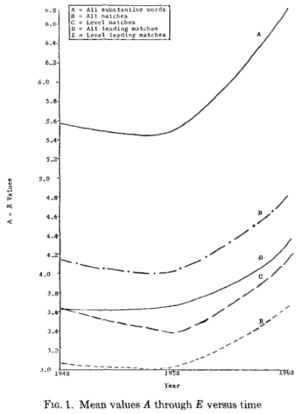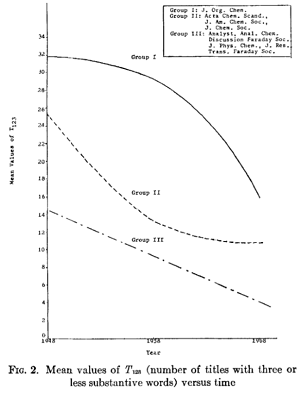There's an interesting discussion of this in the introduction to Titles are "serious stuff": a historical study of academic titles by Salager-Meyer and Alcaraz Ariza (link). One point they argue is that titles (as well as abstracts) increasingly need to be more informative given the growing production of papers, in order for readers to make quick decisions on whether to read them or not. If this is the main factor, the information content would be expected to increase similarly to the size of the relevant academic community.
However, there's something I find much more interesting hidden in the introduction:
Other scholars have stressed that titles should be as informative as possible in order to facilitate the process of storing, searching and retrieving the information (Black 1962; Mitchell 1968; Tocatlian 1970; Feinberg 1973; Manten and Greenhalgh
1977; Hodges 1983; Diodato and Pearson 1985).
The paper by J. D. Black (IBM British Laboratories) is titled The Keyword: Its Use in Abstracting, Indexing and Retrieving Information and discusses how
Librarians have been accustomed to using systems, schedules, thesauri, lists of headings, etc., to define and classify the literature which comes into their keeping. They use these same methods to retrieve and disseminate this literature. However, within recent years these methods have begun to show signs of strain, and in some cases breakdown, due to the tremendous increase in the volume and complexity of technical literature.
Specifically, Black showed that a 1960s era (punch card) computer can be used to extract keywords from a title to achieve a similar efficiency as manual classification, but for significantly cheaper cost, and allowing better scalability. Black also writes
While the index may be practical and usable, we still do not know precisely how efficient it is. In its present form, the efficiency is dependent on the author's choice of title. <...> before long the engineer, scientist, or mathematician will realize that if his title is not descriptive enough his paper will not be used as much as it might be.
Of course, if this automation of title processing is the main factor, one would expect to see a significant increase in the information content of titles starting some point in the late 50s, or early 60s. A 1970 paper by Jacques J. Tocatlian called Are titles for chemical papers becoming more informative? looked at precisely this, by comparing measures of information content between papers published in 1948, 1958, and 1968. (1958 being the year the KWIC index, or Key Word in Context, was introduced.) As Fig. 1 below shows, they found no significant difference between 1948 and 1958, but very different results for 1968. Here the measure A, for example, is defined as the total number of substantive or informative words. On the other hand, Fig. 2 shows that titles with few substantive words might have started being eliminated before the introduction of the KWIC index.


I don't know if there is similar evidence from other fields that the introduction of automated indexing was an important development, but it strikes me as likely that the same mechanisms would apply elsewhere too. So, long story short, a growing number of publications and the introduction of computers may have driven a large part of the push towards more descriptive and informative titles.


